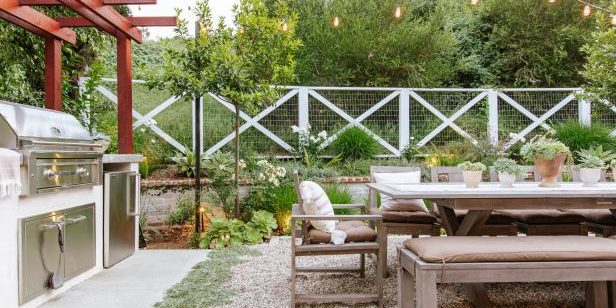When it comes to enhancing your outdoor living space, few features make as significant an impact as a well-designed outdoor kitchen. Not only does it boost your home’s value, but it also transforms your backyard into a vibrant gathering place for friends and family. The key to bringing this vision to life? Partnering with the right outdoor kitchen contractor. In this guide, we’ll walk you through finding the best “outdoor kitchen contractor near me,” ensuring your outdoor culinary space dreams become a reality.
Importance of Choosing the Right Contractor
Quality and Craftsmanship Matter
The craftsmanship of your outdoor kitchen directly influences its durability, functionality, and aesthetic appeal. Choosing a skilled contractor guarantees a space that not only looks stunning but also withstands the test of time.
Ensuring Safety and Compliance
Outdoor kitchens involve complex installations, including gas, plumbing, and electrical work. A reputable contractor ensures that every aspect of your kitchen meets local codes and safety standards, protecting you and your investment.
Long-term Investment and Property Value
A well-constructed outdoor kitchen is a significant investment in your home. Selecting the right contractor ensures that this addition enhances your property’s value, offering substantial returns if you ever decide to sell.
Starting Your Search for an Outdoor Kitchen Contractor
Utilizing Online Directories and Search Engines
Begin your search by typing “outdoor kitchen contractor near me” into your favorite search engine. Online directories and professional networks can also provide listings of local contractors, complete with ratings and reviews.
Leveraging Social Media for Recommendations
Social media platforms are invaluable for gathering recommendations. Post inquiries in local community groups or use hashtags to find contractors with a strong social media presence and portfolio.
Asking for Referrals from Friends and Family
Word-of-mouth remains one of the most reliable ways to find quality contractors. Ask friends and family who have recently undertaken similar projects for their recommendations.
Evaluating Contractor Credentials
Checking Licenses and Certifications
Ensure any contractor you consider is licensed to perform the work required for building an outdoor kitchen. Certifications can also indicate specialized training and a commitment to industry standards.
Verifying Insurance and Bonding
Insurance protects you in case of accidents or damage during the project. A bonded contractor provides an additional layer of financial protection against unfinished work or non-compliance with the contract.
Reviewing Past Work and Portfolio
A contractor’s portfolio is a window into their skill level and experience. Review their past projects to ensure their style and quality align with your expectations for your outdoor kitchen.
Understanding Your Needs and Preferences
Defining Your Outdoor Kitchen Vision
Before reaching out to a contractor, have a clear idea of what you want in your outdoor kitchen. Consider the size, style, appliances, and how you plan to use the space. This clarity will help you communicate your vision effectively.
Considering Your Space and Layout
Take a look at your outdoor space to understand its potential and limitations. A good contractor will help you maximize functionality within your available space, suggesting layouts that enhance flow and usability.
Selecting Materials and Features
Choose materials and features that complement your home’s exterior and stand up to the weather in your area. Your contractor should offer insights into the best materials for durability and aesthetics, from countertops to weatherproof cabinetry.
Getting Quotes and Estimates
How to Request a Detailed Quote
When you’ve shortlisted potential contractors, request detailed quotes that break down costs for materials, labor, design, and any additional fees. This transparency is crucial for comparing offers and avoiding unexpected expenses.
Comparing Prices and Services
Don’t simply opt for the lowest quote. Consider the value each contractor brings, including their experience, warranty offerings, and the quality of materials used. Sometimes, paying a bit more upfront can save you money in the long run.
Understanding the Scope of Work and Timelines
Ensure each quote includes a clear timeline for the project, from design to completion. Understanding the scope of work helps set realistic expectations and ensures the project stays on track.
Questions to Ask Potential Contractors
Experience with Outdoor Kitchens
Ask about their experience specifically with outdoor kitchens. This specialized knowledge is crucial for addressing the unique challenges of outdoor spaces, from weather resistance to integrating utilities.
Project Management and Communication
Inquire about their approach to project management and communication. Reliable contractors will keep you informed throughout the process, from updates on progress to managing any issues that arise.
Handling Permits and Inspections
Confirm that the contractor is familiar with local building codes and will obtain the necessary permits. This due diligence is essential for ensuring your outdoor kitchen is legal and safe.
Assessing Reviews and References
Reading Online Reviews with a Critical Eye
Online reviews can provide valuable insights into a contractor’s reliability and quality of work. Look for patterns in feedback, both positive and negative, to gauge consistency in their performance.
Requesting and Contacting References
Ask for references from past clients, specifically those who had an outdoor kitchen installed. Speaking directly with these clients can give you a sense of the contractor’s process and the satisfaction level with the completed project.
What to Look for in Testimonials and Feedback
Pay attention to comments on the contractor’s professionalism, adherence to budget and timelines, and the overall quality of the finished project. Positive testimonials should reinforce your decision to move forward.
Making the Final Decision
Evaluating the Fit: Professionalism and Personality
The right contractor not only has the technical skills but also communicates well and understands your vision. Ensure their professionalism and personality align with your expectations for a smooth collaboration.
Negotiating Contract Terms and Warranties
A detailed contract protects both you and the contractor. It should include the project scope, cost breakdown, payment schedule, and warranty information. Don’t hesitate to discuss any terms you’re not comfortable with.
Setting Expectations for Project Milestones and Payments
Clear expectations regarding project milestones and payment schedules prevent misunderstandings. Ensure these are outlined in your contract, including any conditions for changes or additional charges.
Preparing for the Project
Site Preparation and Access
Discuss with your contractor how to prepare the site for construction, including clearing the area and ensuring easy access for workers and materials. This preparation can help avoid delays and ensure a smoother project flow.
Coordinating with Other Professionals
If your project requires additional professionals (like landscapers or electricians), understand how coordination will be handled. Will your contractor manage these relationships, or will you need to be involved?
Managing Your Expectations and Being Flexible
Be realistic about timelines and potential challenges. Weather, supply delays, and unforeseen issues can affect progress. Flexibility and open communication with your contractor can help navigate these challenges.
The Construction Process
Understanding the Phases of Construction
Familiarize yourself with the construction phases, from foundation work to installing utilities and final touches. Knowing what to expect at each stage can help you monitor progress and address concerns promptly.
Communication During the Project
Regular updates from your contractor are vital. Establish a preferred method of communication and frequency of updates to keep informed about your project’s status.
Dealing with Delays and Issues
Ask your contractor how they handle delays and unforeseen issues. A proactive approach to problem-solving and clear communication can minimize the impact on your project timeline and budget.
Post-Construction: Enjoying Your New Outdoor Kitchen
Final Inspections and Walk-Throughs
Participate in a final walk-through with your contractor to ensure everything is completed to your satisfaction. This is the time to address any final tweaks or corrections.
Maintenance Tips and Upkeep
Discuss maintenance and care for your new outdoor kitchen to keep it in top condition. Your contractor can provide tips on cleaning, winterizing, and general upkeep.
Warranty and Service Follow-Up
Understand the warranty coverage for your outdoor kitchen and what it includes. Ensure you have all necessary documentation and know how to contact your contractor for any follow-up service or warranty claims.
Frequently Asked Questions (FAQs)
1. How much does an outdoor kitchen cost?
The cost of an outdoor kitchen varies widely depending on size, materials, appliances, and labor. Prices can range from a few thousand dollars for a basic setup to over $50,000 for a fully equipped, high-end space.
2. How do I find a reputable outdoor kitchen contractor near me?
Start by searching online directories, asking for referrals from friends and family, and checking out social media and review sites. Look for contractors with good reviews, a solid portfolio of completed projects, and the necessary licenses and insurance.
3. What should I include in my outdoor kitchen?
Common features include grills, cooktops, refrigerators, sinks, counters, and storage cabinets. Consider your cooking and entertaining needs, space, and budget when deciding what to include.
4. Do I need a permit to build an outdoor kitchen?
In many cases, yes. The requirements vary by location, so check with your local building department. A reputable contractor should handle permits and ensure that the project complies with local codes and regulations.
5. How long does it take to build an outdoor kitchen?
The timeline can vary from a few weeks to several months, depending on the project’s complexity, design decisions, permit approval process, and weather conditions. Your contractor should provide a realistic timeline.
6. How can I ensure my outdoor kitchen is weatherproof?
Choose durable, weather-resistant materials designed for outdoor use. Stainless steel for appliances, marine-grade polymer for cabinetry, and stone or concrete for countertops are good choices. Your contractor can advise on the best materials for your climate.
7. Can I build an outdoor kitchen on an existing patio or deck?
Yes, in many cases, you can. However, the structure must be strong enough to support the additional weight and meet any local codes or regulations. A professional contractor can assess your space and make the necessary recommendations.
8. What is the best layout for an outdoor kitchen?
The best layout depends on your space, needs, and how you plan to use the kitchen. Common layouts include straight (along one wall), L-shaped, U-shaped, and island. Your contractor can help design a layout that maximizes efficiency and entertainment value.
9. How do I maintain my outdoor kitchen?
Maintenance varies by material and appliance but generally includes regular cleaning, covering appliances and furniture when not in use, and winterizing water lines in colder climates. Your contractor can provide specific maintenance tips for your kitchen.
10. Is it worth investing in an outdoor kitchen?
For many homeowners, the answer is yes. Outdoor kitchens can enhance your living space, make entertaining easier, and increase your home’s value. Consider your lifestyle and how much you’ll use the space to determine if it’s a worthwhile investment for you.
Conclusion
Embarking on an outdoor kitchen project is an exciting venture that can transform your outdoor living space. Finding the right outdoor kitchen contractor near me is a journey that involves research, communication, and collaboration. By following the steps outlined in this guide, you’re well on your way to creating an outdoor kitchen that not only meets but exceeds your expectations. Remember, a successful project is a partnership between you and your contractor, built on trust, clear communication, and a shared vision.







